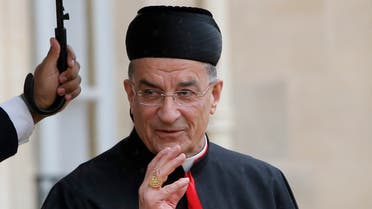Lebanon’s top Christian patriarch backs central bank governor after criticism
Lebanon’s politically influential Maronite Christian patriarch backed the long-serving central bank governor on Sunday, after the prime minister cast bank chief Riad Salameh as responsible for a currency crash that has worsened sharply in recent days.
The pound, which has lost more than half its value since October, slid to record lows on a parallel market over the past week, losing some 15 percent of its value. Prime Minister Hassan Diab sharply criticized Salameh on Friday.
Currency changers have gone on strike and the parliament speaker urged the government to use “legal powers” to halt the fall in the pound.
The past two days have seen bomb and firebomb attacks on banks, although there were no reports of injuries.
Amid a growing debate over whether the bank governor of 27 years should resign, Maronite Patriarch Bechara Boutros Al-Rai, Lebanon’s top Christian religious authority, said criticism of Salameh would only hurt the country.
“We ask: who benefits from the destabilization of the central bank governorship? The beneficiary himself knows,” said Rai. “We know the dire outcome, which is eliminating the confidence of the Lebanese people and (foreign) states in the constitutional foundations of the state.”

Lebanon is governed according to a sectarian political system that parcels out state positions according to religious group. The central bank governorship is reserved for a Maronite Christian while the premier is always a Sunni Muslim.
Diab’s government was formed in January with the support of Lebanese Hezbollah and has struggled to enact stalled reforms demanded by foreign donors.
Gebran Bassil, head of President Michel Aoun’s Maronite Christian party, echoed many of Diab’s criticisms, saying the central bank bore “great responsibility” for losses incurred and lack of transparency and coordination.
Bassil said the state must now take responsibility for “correcting” these mistakes, and said such moves would not constitute a “coup against the free financial system or central bank independence.”
The currency’s rapid fall has raised the prospect of price hikes and broader unrest at a time when unemployment has soared and a coronavirus lockdown has dealt an additional blow.

On Saturday a small bomb was detonated outside a commercial bank in the southern city of Sidon, damaging its facade. A bank in the city of Tyre was attacked with Molotov cocktails early on Sunday, security sources said.
The attacks did not result in any injuries and the assailants remain unknown, the security sources said.
Read more:
Lebanon’s Fransabank attacked with explosive amid economic crisis
Coronavirus can stay in a patient’s eyes long after it leaves their nose
Coronavirus: Saudi Arabia reports nine deaths, 1,197 new cases
-

Lebanon’s Fransabank attacked with explosive amid economic crisis
Assailants lobbed an explosive device at a branch of Fransabank in the Lebanese ... Middle East -

As currency crisis deepens, Lebanon PM Diab rebukes central bank governor
Lebanese Prime Minister Hassan Diab rebuked central bank governor Riad Salameh on ... Economy -

Lebanon c. bank sets exchange rate of 3,625 lira to dollar: Bank source
The Lebanese central bank set an exchange rate of 3,625 Lebanese pounds per dollar ... Economy
